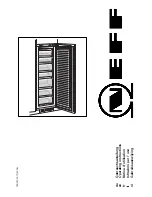
6-3
IIc
ce
e M
Ma
ak
ke
err
W
Wa
atte
err V
Va
allv
ve
e A
As
ss
se
em
mb
blly
y
The water valve is solenoid operated and when
energized, releases water from the household
supply into the ice mold. The amount of water
released is directly proportional to the length of
time the water valve switch is energized. A flow
washer, inside the water valve, maintains a
constant rate of water flow over a supply line with
pressure ranging from 20 to 100 psig. It will not
compensate for pressures below 20 psig, or
greater than 100 psig. A No. 80-mesh screen,
placed ahead of the flow washer, filters out foreign
materials.
The solenoid coil draws 10 to 20 watts of power.
The coil is wired in series with the mold heater,
across the supply voltage.
T
Th
he
errm
mo
os
stta
att
The thermostat is a single-pole, single throw
(SPST), bimetallic, disk-type, thermal switch. It
automatically starts the harvest cycle when the ice
is frozen. The thermostat closes at a temperature
of 9°F ± 2°. Wired in series with the mold heater,
the thermostat acts as a safety device against
overheating in the event of mechanical failure. A
thermal mastic bond is provided where the
thermostat is mounted against the mold. A gasket
prevents water from leaking into the support
housing.
S
Se
en
ns
siin
ng
g A
Arrm
m &
& L
Liin
nk
ka
ag
ge
e
The sensing arm is cam-driven and operates a
switch that controls the quantity of ice produced.
In the harvest cycle, the arm is raised and lowered
during each of the two revolutions of the timing
cam. If the sensing arm comes to rest on top of
ice in the storage compartment during either
revolution, the switch will remain open and stop
the ice maker at the end of that revolution. When
sufficient ice is removed from the storage
container, the sensing arm lowers and ice
production resumes. To manually stop the ice
maker turn the switch located on the housing at
the left end of the ice maker to off. Operation is
resumed when the switch is turned back to on.
IIc
ce
e M
Ma
ak
ke
err C
Co
om
mp
po
on
ne
en
ntts
s
F
Frro
on
ntt C
Co
ov
ve
err
A decorative front cover, made of molded plastic,
encloses the operating mechanism of the ice
maker, protecting it from moisture. It is essential
that the cover be in place on an operating ice
maker to protect against possible contact with the
mechanism by the user.
IIc
ce
e M
Mo
olld
d
The ice mold is die-cast aluminum with the ice
maker thermostat bonded to its front surface. The
mold has a semi-circular interior partitioned into
equal size compartments. Water enters at the side
of the mold, through a fill trough. A film of silicon
grease on the top edge of the mold prevents
siphoning of water by capillary action.
M
Mo
olld
d H
He
ea
atte
err
A mold heater, rated at 112 watts at 115volts, 108
ohms ± 10% it is covered with an aluminum
sheath and embedded in the grooved section on
the underside of the ice mold. When the mold
heater is energized, the ice contact surface within
the mold is heated enough to allow harvest of the
ice pieces.
The mold heater is wired in series with the ice
maker thermostat, which acts as a safety device.
The heater is staked in place, and is replaced as
part of the ice maker mold.
A thermal mastic sealer is placed between the
heater and the mold to ensure good thermal
contact.
IIc
ce
e S
Sttrriip
pp
pe
err
An ice stripper is attached to the mold to prevent
ice pieces from falling back into the mold. It also
serves as a decorative side cover.
IIc
ce
e E
Ejje
ec
ctto
orr
The ejector blades are molded from delrin, and
extend from a central shaft, which turns in nylon
bearings at the front and rear. Each blade sweeps
an ice section out of the mold. The drive end of
the ice ejector is “D” shaped. Food grade silicone
grease is used to lubricate the bearing surfaces.
Summary of Contents for EILFU17GS
Page 2: ......
Page 56: ...5 16 C Co om mp po on ne en nt t T Te ea ar rd do ow wn n Notes ...
Page 57: ...6 1 I Ic ce e M Ma ak ke er r S Se ec ct ti io on n 6 6 I Ic ce e M Ma ak ke er r ...
Page 70: ...6 14 I Ic ce e M Ma ak ke er r Step 3 Step 4 Step 5 Step 6 ...
Page 71: ...6 15 I Ic ce e M Ma ak ke er r Step 7 Step 8 Step 9 Step 10 ...
















































